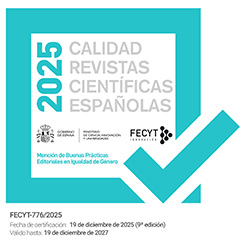Looking into the patriarchal world of Roald Dahl's short story "Taste" through and beyond its narrator
Keywords:
Roald Dahl, adult short stories, narrators and focalizors, gender, classAbstract
This article reflects on the presence of narrators in Roald Dahl’s short stories for adults, especially those in which the account is carried out by one of the characters. After underlining a number of features common to these narratives, it’s my aim to analyse the presence of the narrator in one of his most well-known short stories, “Taste”, and my main contention is that a careful consideration of this presence enriches the reading of the story. Even though the narration is carried out by a secondary character, whose role in the development of events might be minimum, his participation as narrator/commentator of the events allows to address both gender and class issues; furthermore, John Berger’s concept of gaze becomes a very useful element with which to uncover the narrator’s sympathies with a society ruled by patriarchal and classist parameters.
Downloads
References
Bal, Mieke. Narratology: Introduction to the Theory of Narrative. Trans. Christine van Boheemen. Toronto: University of Toronto Press, 1988 (1980).
Berger, John. Ways of Seeing. London: Penguin Classics, 1977 (1972).
Dahl, Roald. Over to You. Ten Stories of Flyers and Flying. New York: Reinal and Hitchcock, 1946.
---. Someone Like You. New York: Alfred Knopf & London: Penguin Books, 1970 (1953).
---. Kiss, Kiss. New York: Alfred Knopf, 1959.
---. Switch Bitch. New York: Alfred Knopf, 1974.
---. The Wonderful Story of Henry Sugar and Six More. London: Jonathan Cape, 1977.
---. Ah Sweet Mystery of Life. London: Michael Joseph, 1989.
Genette, Gerard. Narrative Discourse: An Essay in Method. Trans. Jane E. Lewin. Ithaca, New York: Cornell University Press, 1980.
Holindalle, Peter. “Roald Dahl: the Conservative Anarchist.” Pop Fiction. Ed. Pinsent, Pat. London: NCRCL, 1999. 137-151.
Hunt, Peter. “Roald Dahl and the Commodification of Fantasy.” Roald Dahl (New Casebooks). Ed. Alston, Ann and Catherine Butler. London: Palgrave Macmillan, 2012. 176-189.
Makman, Lisa Hermine. “Roald Dahl.” British Writers. Supplement 4. Ed. Stade, George and Carol Howard (1997): 201-227.
Millet, Kate. Sexual Politics. London: Virago Press, 1977 (1969).
Niederhoff, Burkhard. “Focalization”. The Living Book of Narratology. Ed. Hühn, Peter et al. Hamburg: Hamburg University. Web. 7 Oct. 2015. <http://www.lhn.uni-hamburg.de/article/focalization>.
Viñas, Laura. “The Narrative Voice in Roald Dahl’s Children’s and Adult Books.” Didáctica, Lengua y Literatura 20 (2008): 291-308.
West, Mark I. Roald Dahl. Charlotte, North Caroline: Twayne Publishers Inc, 1992.
Downloads
Published
Issue
Section
License
Authors who publish with this journal agree to retain copyright and grant the journal right of first publication with the work simultaneously licensed under a Creative Commons Attribution License that allows others to share the work with an acknowledgement of the work's authorship and initial publication in this journal. Also, authors will retain the rights on their work, even if they will be granting The Grove. Working Papers on English Studies a non-exclusive right of use to reproduce, edit, distribute, publicly communicate and show their work. Therefore, authors are free to engage in additional, independent contracts for non-exclusive distribution of the works published in this journal (such as uploading them to an institutional repository or publishing them in a book), as long as the fact that the manuscripts were first published in this journal is acknowledged.

























